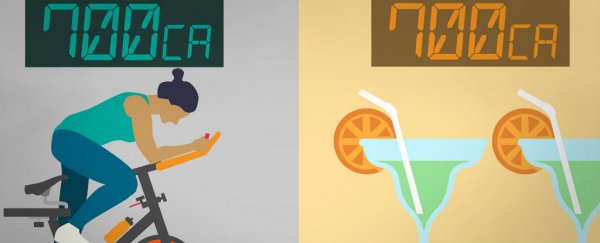In a world where many of us are opting for calorie-laden takeaway meals rather than homemade, while sitting down for longer periods of time than humans ever have before, shedding kilos is something that weighs heavy on the minds of nearly half of all Americans right now.
And while we're used to hearing the old, "Eat less, exercise more" adage, I've got some bad news for you - the scientific literature doesn't actually support exercise as being an effective weight-loss solution at all.
As Kevin Hall, a senior investigator at the US National Institutes of Health tells Vox in the video above:
"We need to rebrand exercise. Exercise isn't a weight-loss tool per se; it's excellent for health, it's probably the best single thing that you can do other than stopping smoking to improve your health, but don't look at it as a weight-loss tool."
Now before you go rage-quitting your sports teams and cancelling your gym membership, remember: exercise is your best shot of ensuring a long and healthy life, so you're still getting a hell of a lot out of all those squats.
But the reason why we shouldn't expect exercise to have a significant effect on our waistlines and thighs is the simple fact that it's not the only thing our bodies use to burn calories every day.
As the video explains, there are three main ways our bodies use the energy we get from nutrients: 1) the resting metabolism, meaning the energy needed for basic functioning when the body is at rest; 2) food breakdown - the energy needed to break down food; and 3) physical activity, which is the energy we need to get up and run around.
Not all three mechanisms of calorie-burning are equal - in fact, the resting metabolism actually takes care of the majority of your calories every day, and unlike physical activity, you don't have much control over how this will go.
In other words, it's extremely difficult to control your calorie deficit through exercise alone, and could actually hinder your progress if you're not careful.
"While 100 percent of your calories in are up to you, only about 30 percent of your calories out in are your control," says Vox's Christophe Haubursin.
The suggestion that diet is actually far more important than exercise in the pursuit of weight-loss is something that's starting to gain more traction, with a study from earlier this year finding that physical activity only has a "weak" influence on the amount of calories burnt by hundreds of participants - and exercising harder didn't equate to burning more calories.
"What our work adds is that we also need to focus on diet, particularly when it comes to managing our weight and preventing or reversing unhealthy weight gain," said lead researcher Herman Pontzer from the City University of New York.
Watch the video above to find out more. It's got info in there from 60 studies, including high-quality, systematic reviews of recent research into exercise and weight-loss, so if you're looking to shed some kilos, here's how you can base your strategy on actual scientific fact.
